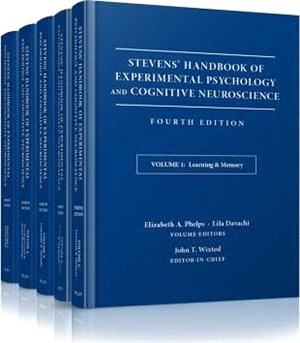Stevens' Handbook Of Experimental Psychology And Cognitive Neuroscience, Fourth Edition, Five Volume Set
商品資訊
ISBN13:9781119170167
出版社:John Wiley & Sons Inc
作者:Wixted
出版日:2018/03/16
裝訂/頁數:精裝/3360頁
規格:49.5cm*36.8cm*15.2cm (高/寬/厚)
版次:4
商品簡介
Since the first edition was published in 1951, The Stevens' Handbook of Experimental Psychology has been recognized as the standard reference in the field. The most recent (3rd) edition of the handbook was published in 2004, and it was a success by any measure. But the field of experimental psychology has changed in dramatic ways since then. Throughout the first 3 editions of the handbook, the changes in the field were mainly quantitative in nature. That is, the size and scope of the field grew steadily from 1951 to 2004, a trend that was reflected in the growing size of the handbook itself: the 1-volume first edition (1951) was succeeded by a 2-volume second edition (1988) and then by a 4-volume third edition (2004). Since 2004, however, this still-growing field has also changed qualitatively in the sense that, in virtually every subdomain of experimental psychology, theories of the mind have evolved into theories of the brain. Research methods in experimental psychology have changed accordingly and now include not only venerable EEG recordings (long a staple of research in psycholinguistics) but also MEG, fMRI, TMS, and single-unit recording. The trend towards neuroscience is an absolutely dramatic, worldwide phenomenon that is unlikely to ever be reversed. Thus, the era of purely behavioral experimental psychology is already long gone, even though not everyone has noticed. Experimental psychology and "cognitive neuroscience" (an umbrella term that includes behavioral neuroscience, social neuroscience and developmental neuroscience) are now inextricably intertwined. Nearly every major psychology department in the country has added cognitive neuroscientists to its ranks in recent years, and that trend is still growing. A viable handbook of experimental psychology should reflect the new reality on the ground.
There is no handbook in existence today that combines basic experimental psychology and cognitive neuroscience, this despite the fact that the two fields are interrelated – and even interdependent – because they are concerned with the same issues (e.g., memory, perception, language, development, etc.). Almost all neuroscience-oriented research takes as its starting point what has been learned using behavioral methods in experimental psychology. In addition, nowadays, psychological theories increasingly take into account what has been learned about the brain (e.g., psychological models increasingly need to be neurologically plausible). These considerations explain why this edition of: The Stevens' Handbook of Experimental Psychology is now called The Stevens' Handbook of Experimental Psychology and Cognitive Neuroscience. The title serves as a reminder that the two fields go together and as an announcement that the Stevens' Handbook covers it all.
The 4th edition of the Stevens’ Handbook is a 5-volume set structured as follows:
I. Learning & Memory: Elizabeth Phelps & Lila Davachi (Volume Editors)
Topics include fear learning; time perception; working memory; visual object recognition; memory and future imagining; sleep and memory; emotion and memory; attention and memory; motivation and memory; inhibition in memory; education and memory; aging and memory; autobiographical memory; eyewitness memory; and category learning.
II. Sensation, Perception & Attention: John Serences (Volume Editor)
Topics include attention; vision; color vision; visual search; depth perception; taste; touch; olfaction; motor control; perceptual learning; audition; music perception; multisensory integration; vestibular, proprioceptive, and haptic contributions to spatial orientation; motion perception; perceptual rhythms; the interface theory of perception; perceptual organization; perception and interactive technology; perception for action.
III. Language & Thought: Sharon Thompson-Schill (Volume Editor)
Topics include reading; discourse and dialogue; speech production; sentence processing; bilingualism; concepts and categorization; culture and cognition; embodied cognition; creativity; reasoning; speech perception; spatial cognition; word processing; semantic memory; moral reasoning.
IV. Developmental & Social Psychology: Simona Ghetti (Volume Editor)
Topics include development of visual attention; self-evaluation; moral development; emotion-cognition interactions; person perception; memory; implicit social cognition; motivation
group processes; development of scientific thinking; language acquisition; category and conceptual development; development of mathematical reasoning; emotion regulation; emotional development; development of theory of mind; attitudes; executive function.
V. Methodology: E. J. Wagenmakers (Volume Editor)
Topics include hypothesis testing and statistical inference; model comparison in psychology; mathematical modeling in cognition and cognitive neuroscience; methods and models in categorization; serial versus parallel processing; theories for discriminating signal from noise; Bayesian cognitive modeling; response time modeling; neural networks and neurocomputational modeling; methods in psychophysics analyzing neural time series data; convergent methods of memory research; models and methods for reinforcement learning; cultural consensus theory; network models for clinical psychology; the stop-signal paradigm; fmri; neural recordings; open science.
主題書展
更多書展今日66折
您曾經瀏覽過的商品
購物須知
外文書商品之書封,為出版社提供之樣本。實際出貨商品,以出版社所提供之現有版本為主。部份書籍,因出版社供應狀況特殊,匯率將依實際狀況做調整。
無庫存之商品,在您完成訂單程序之後,將以空運的方式為你下單調貨。為了縮短等待的時間,建議您將外文書與其他商品分開下單,以獲得最快的取貨速度,平均調貨時間為1~2個月。
為了保護您的權益,「三民網路書店」提供會員七日商品鑑賞期(收到商品為起始日)。
若要辦理退貨,請在商品鑑賞期內寄回,且商品必須是全新狀態與完整包裝(商品、附件、發票、隨貨贈品等)否則恕不接受退貨。
























